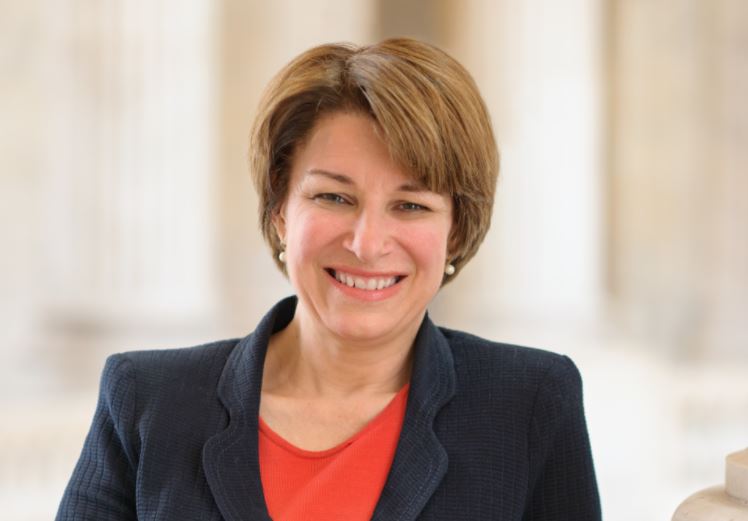Klobuchar pledges support for NG911 funding, does not address specifics of proposal
Sen. Amy Klobuchar (D-Minn.)—a co-chair of the Congressional Next-Gen 911 Caucus—vowed to sponsor legislation once again that calls for at least $12 billion in federal funding to upgrade public-safety answering points (PSAPs) to next-generation-911 (NG911) technology, but she did not release any details of her proposal.
Two years ago, Klobuchar sponsored the “Next Generation 911 Act of 2019,” a bill that called for $12 billion in federal funds for pay for NG911 upgrades nationwide. The language of that bill was included in an infrastructure package that was approved in the Democrat-controlled House but not the Republic-controlled Senate.
Klobuchar unveiled her plans to again sponsor NG911 legislation during her keynote address for the NG911 Institute session conducted in conjunction with the National Emergency Number Association (NENA) virtual “911 Goes to Washington” event.
“As co-chair of the Congressional Next-Gen 911 Caucus, along with Senator Burr [Sen. Richard Burr (R-N.C.)], I understand how incredibly important your work continues to be and the need to modernize the nation’s outdated 911 system,” Klobuchar said during her keynote speech on Tuesday. “That’s why I will be reintroducing the Next-Generation 911 Act with my colleague and friend, Senator Cortez Mastro of Nevada [Sen. Catherine Cortez Mastro (D-Nev.)]. This legislation creates a federal grant program to help state and local governments deploy next-generation 911 systems all across the nation.
“These upgrades will enable 911 professionals to handle text messages, videos and other information sent by smartphones, tablets and other devices that are used in an emergency. In crisis, no one should be put in danger because of outdated 911 systems. Telecommunicators, first responders, public-safety officials and law enforcement—you must all be able to communicate seamlessly. This legislation will ensure that we have a modern system for emergency-response communications.”
A longtime advocate for 911, Klobuchar’s support of federal funding to help pay for the migration to IP-based NG911 platforms is not surprising to anyone. However, several public-safety sources told IWCE’s Urgent Communications that they are not sure where Klobuchar stands on some of the more controversial issues surrounding proposed federal NG911 funding that have arisen during the past year.
Klobuchar said she would be “reintroducing the Next-Generation 911 Act,” which normally would be a straightforward process of sponsoring the same legislation that she sponsored in 2019. But many in the public-safety community questioned whether Klobuchar would want to reintroduce the 2019 bill that calls for $12 billion in funding—as well as a 20% local-government match to receive grant funding—when the new House infrastructure bill includes language that would provide $15 billion in NG911 funding with no requirement for a local match.
In addition, Klobuchar’s 2019 NG911 bill included language supported by NENA, iCERT and the National Association of 911 Administrators (NASNA) in several key areas, notably in its support of the NENA i3 standard as the basis for NG911 architecture. In contrast, the standards language in the new House legislation—supported by the Public Safety Next Generation 911 Coalition, which includes the Association of Public-Safety Communications Officials (APCO)—has been criticized by NENA, iCERT and NASNA as being potentially detrimental to the 911 community.
Klobuchar provided no indication which funding level and which language she currently supports during her keynote speech on Tuesday. Multiple calls by IWCE’s Urgent Communications to Klobuchar’s office this week to clarify the senator’s position on these matters were not returned in time to be included in this article.
Staff members for Rep. Anna Eshoo (D-Calif.)—another co-chair of the Congressional Next-Gen 911 Caucus—have been credited for putting the $15 billion NG911 funding language LIFT America Act introduced as the House Democrats’ proposal to revamp U.S. infrastructure. But Klobuchar said she hopes her NG911 language will be in the final legislation that Congress could pass later this year.
“Last Congress, my bill was included in the House infrastructure bill that passed the House in July 2020, and I’m working tirelessly to ensure that it is included in the major infrastructure bill that Congress is expected to consider very soon,” Klobuchar said during her keynote address.
Historically, most public-safety matters have been addressed at the state and local levels, but longtime Beltway observers have noted that Congress has provided significant federal support when a public-safety consensus develops around issues like 700 MHz spectrum in the 1990s, interoperability funding in the 2000s, and FirstNet in 2012.
All of public safety is united behind the need for NG911 funding, but some in the first-responder community have expressed concerns that disagreements about standards language and cybersecurity approaches—not only within public safety but potentially with competing bills in Congress—could undermine these efforts.
Indeed, a few public-safety sources have noted that President Joe Biden’s recently released infrastructure proposal did not even mention NG911 funding. However, other sources in the first-responder community have indicated that they are not worried about the omission of NG911 funding by Biden—a key supporter of the 2012 law that created FirstNet when he was vice president—noting that the White House proposal is being positioned officially as a jobs plan instead of an infrastructure package.
Several Beltway sources have noted that is important that NG911 funding be included in this proposed infrastructure initiative, because it is questionable whether Congress will be willing to approve any more multi-trillion-dollar spending bills in the near future after multiple large stimulus packages have been passed during the past year.
In a related matter, Klobuchar joined Rep. Norma Torres (D-Calif)—a former 911 professional—in announcing support for the federal government reclassifying 911 telecommunicators from their current clerical status through the passage of the 911 SAVES Act sponsored by Torres in the House.
“Telecommunicators are vital to public safety, and it is important that your job classification reflects the life-saving work that you perform every day,” Klobuchar said. “That’s why, with Sen. Burr, I introduced the bipartisan 911 SAVES Act to recognize the vital role that telecommunicators play by reclassifying them as protective service workers.”

















